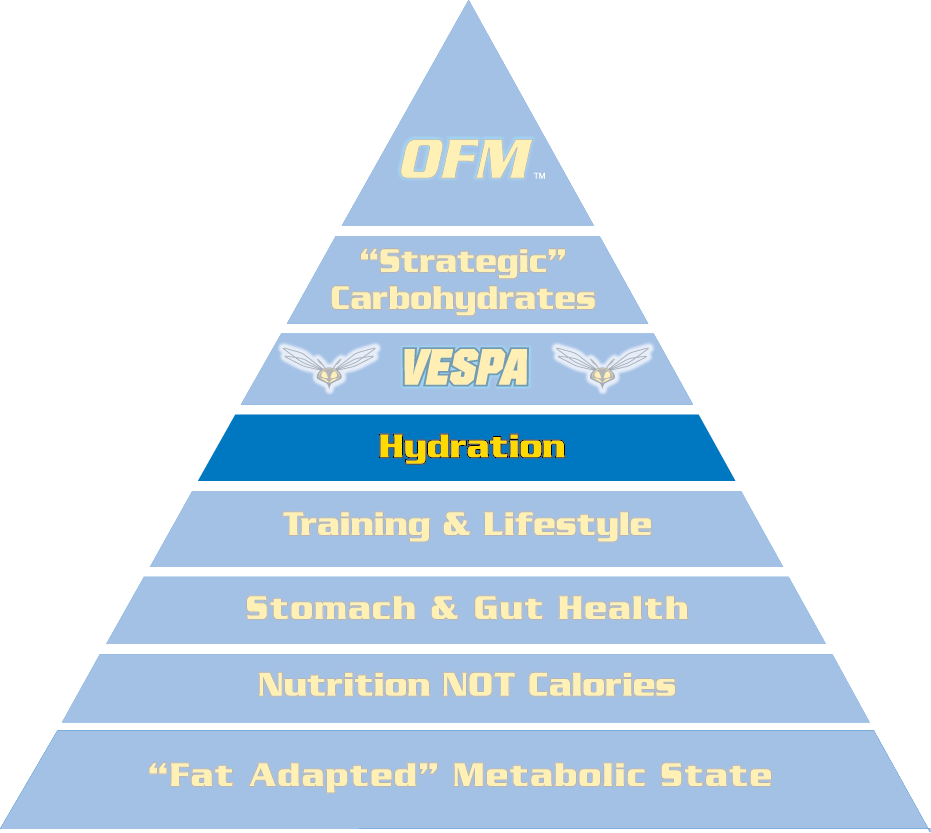
Hydration is highly DYNAMIC! This is why we feel sweat rate testing is mis-leading for most people. This gives a reference of an athlete’s sweat rate at a given point in time at a certain effort level/intensity, temperature, humidity and altitude. As the variables change so do the Hydration needs of the athlete.
Sodium is vital to maintaining proper blood volume. When exercising, particularly in the heat, high sweat rates without proper supplementation of sodium/salt based electrolytes can trigger Hypovolemia (https://en.wikipedia.org/wiki/Hypovolemia) . Hypovolemia is a nuanced sibling so to speak of Dehydration (https://en.wikipedia.org/wiki/Dehydration). While other electrolytes like Potassium, Calcium, Magnesium, etc. are all important components for cellular function and health, sodium is the principle electrolyte controlling blood volume particularly during exercise, thus maintaining adequate blood volume is crucial for both performance and health.
To optimize hydration, keep these concepts in mind:
- Generally speaking, the athlete will require more salt (NaCl) and water during physical activity, particularly in the heat because salt (NaCl) constitutes the majority of the electrolytes lost via sweat during physical activity (i.e. this is why sweat tastes “salty”). In cool to cold weather this is much less of an issue.
- Do NOT Pre-hydrate! Pre-hydrating in the hours and/or days prior to an event above normal “drinking to thirst” is not only useless but detrimental to the body’s ability to provide sustained performance during physical activity.
- Pre-hydrating is advised within minutes of commencing physical activity by drinking an isotonic solution of water to electrolytes or a hypertonic solution followed by sipping on water.
- Proper hydration is about having the right fluid balance of water to electrolytes, principally salt (isotonic). It is recommended most athletes learn intuitively what they need to do on the fly but use these basic rules of thumb: First, do NOT take your electrolytes by time (as many instructions for taking electrolytes often state)…when cold you may get the fluid balance off by taking in too much salt to water (hypertonic, sausage fingers etc.) and in the heat most athletes will find themselves short on salt (hypotonic, sloshy stomach, hyponeutremic, nauseous). Second, the suggestion is for every 4-6 ounces of water take in about 100 Mg of Sodium (NA) mainly as Salt (Sodium Chloride / NaCl). What does this mean in the real world? For those of you using S!CAPS it means 1 S!CAP for every 10-14 ounces of water or 3-4 capsules per two water bottles. If you use Salt Stick then it would be 1 salt Stick (not Salt Stick Plus) for every 8-10 ounces of water or 4-5 per two water bottles. For many pre-mix electrolyte supplements such as NUUN, ZYM, LMNT, The Right Stuff and others may be a more practical approach. Look on the back of your electrolyte supplement for the Sodium (Na) content and see what it is and calculate the ratio of salt to water based upon the 100 Mg Na to 4-6 ounces of water. (The reason for a range is because of a number of variables like your own adaptation to heat, humidity, altitude etc. When it is hot, high and dry the ratio can be diluted as a significant amount of water vapor is lost due to respiration and not just sweat.)
- In the heat, focus on hydration and minimize caloric intake. When hot, your body sharply down regulates blood flow to the internal organs so it can up-regulate blood flow from the muscles to skin surface for thermo-regulation. So the higher the cooling capacity the more energy can be exerted or the faster you can run or bike etc. Under this set of conditions your body can easily assimilate the proper fluid balance but has extremely limited capacity to digest calories. If the athlete exceeds this amount of caloric intake capability in the heat (which is highly variable and dynamic), not only does the stomach shut down from absorbing calories but this shut down sharply impairs fluid uptake for hydration. When this occurs things go really sideways: blood plasma levels diminish rapidly as the sweat is not being replaced. Dehydration sets in. At the same time the sugars in the shutdown stomach often begin to ferment creating intestinal havoc ….the athlete then throws up furthering the fluid loss etc.
- NEVER use caffeinated gels (>30mg caffeine) in the heat. Caffeine, being a slight diuretic, will cause an already on-edge hydration/thermo-regulation balance to be thrown off. Caffeine, on the other hand, can be used effectively in cool to cold conditions to enhance performance. It can also aid fluid loss during 100 Milers when it is hot during the day and cold at night (i.e.: use caffeine when the temperature shifts down because your body will still want to take in a lot of fluid for hours before it compensates for the temperature change.).
- During the Rest & Recovery phase consume mostly minimally processed whole foods (fresh vegetables, fruits, meats etc.), Avoid concentrated forms of carbohydrates to prevent fluid retention and salt food to taste. This should provide the correct balance of electrolytes necessary. If the athlete is participating in endurance sports activities or has high volume of training it is recommended he/she supplement with home-made broth or soups and sauces made from these broths (link to broth recipe) on a regular basis.
- Magnesium is a trace mineral most athletes wind up deficient in so athletes should consider supplementing with Magnesium. Because there are so many forms of Magnesium supplements, many with limited bio-availability, the recommended form is Magnesium in the electrolyte form of Magnesium Chloride, a naturally occurring salt. Please see supplementation for more information on Magnesium and other forms you can use.
Fat Adapted athletes do require a higher salt intake overall, however, during physical activity, (especially in the heat) the amount of salt necessary for optimal performance tends to surprise most people. Many athletes report a sodium intake of 800-1500+ mg/hour when competing under warm to hot conditions.

